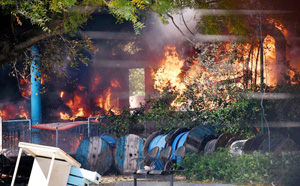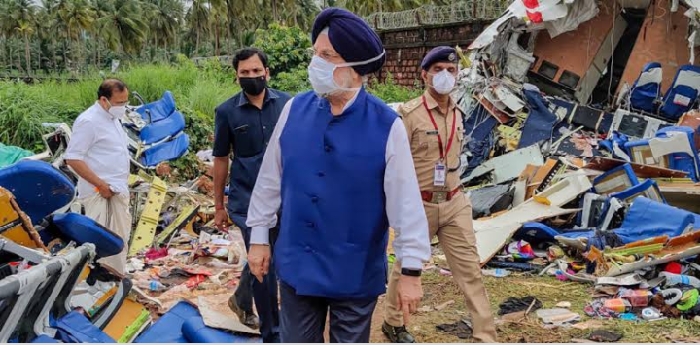New Delhi, Mar 22: A major fire broke out at the AC plant inside Parliament complex here today while welding work was underway gutting the unit and affecting air conditioning in the main building and it took ten fire engines to douse the flames in about 30 minutes.
Delhi Fire Service Chief A K Sharma said prima facie it appeared to be a case of negligence as laid down safety norms were not followed in the maintenance work.
The Fire department got a call at fire at 2:21 PM and ten fire tenders were rushed to the spot immediately to bring the blaze under control. There were no injuries, fire officials said.
Thick black smoke was seen billowing above the red sandstone boundary wall of the 88-year-old Parliament complex as the flames raged just a few hundred metres away from the main building which suffered no damage.
Both the Lok Sabha and the Rajya Sabha had gone on a month-long break on Friday.
"We had got a call at 2:21 PM following which 10 fire tenders, including two hydraulic platforms under the supervision of a deputy chief fire officer were rushed to the spot and it was brought under control by 2:40 PM. By 2:50 PM, it was completely doused. I can confirm that there is no fire and there is no injury to anybody," said A K Sharma (Director) Delhi Fire Service.
Police said that they will enquire into the cause and circumstances of the incident and responsibility will be fixed. "We have initiated an enquiry into the matter. We will look into all aspects including the cause and circumstances of the fire and take action against those found responsible," Joint Commissioner of Police (New Delhi) M K Meena told reporters.
Home Ministry has sought a report on the incident. President Pranab Mukherjee also expressed serious concern over the fire and asked for an urgent enquiry into its cause.
This was the second case of fire inside the complex in the last couple of days as a minor fire was reported in the AC wiring at gate number 5 on Thursday.
The AC power plant is on the periphery of the Parliament complex near gate number 8, on the right side of the reception area.
"The cause of fire was welding which was going on for some maintenance work. Since the Parliament is currently not in session, maintenance work was going on at the AC plant and the sparks caused by the welding led to the fire. There is an AC plant room in the open, its PVC material coating, insulation had caught fire," said Sharma.
"It is a subject matter of investigation whether safety measures were put in place or not. Prima facie it seems that precautions were not taken. My job was of the respondent. Now it is up to the police and Parliament authorities to probe it," said Sharma.
Police and security personnel quickly cordoned off the area as onlookers and media crew flocked to the high-security zone in the heart of the national capital.
Sharma said that there was no delay in responding to the fire as Parliament House is a sensitive area. One fire engine remains stationed inside the Parliament complex. Our men were informed through wireless message and the fire tender was instantly at work. In addition to this fire tenders were rushed from our Rakabgunj and Connaught Place fire stations.
The thick black smoke which you saw was because of burning of plastic and insulation material besides two cooling tanks, Sharma said. "The AC plant is completely gutted and it will need a major overhaul," he added.






Comments
Add new comment